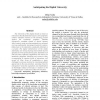Free Online Productivity Tools
i2Speak
i2Symbol
i2OCR
iTex2Img
iWeb2Print
iWeb2Shot
i2Type
iPdf2Split
iPdf2Merge
i2Bopomofo
i2Arabic
i2Style
i2Image
i2PDF
iLatex2Rtf
Sci2ools
76
Voted
ICDS
2009
IEEE
2009
IEEE
Anticipating the Digital University
The University of the Digital Society is based on interactions that facilitate learning in a new pragmatic context. Catalysts involved in the learning process replace the traditional professor. Students dynamically constitute classes of shared interest, which cease to exist once learning goals are achieved or prove unattainable. Learning, procedural in nature, takes place in the interaction, eventually embodied in a project. The digital infrastructure of the widely distributed, new virtual learning environment must be specified in terms of educational goals. Extremely rich data and many different computations will have to be seamlessly integrated. Modeling and access to data, corresponding to intuitive forms of interaction, will exceed all other forms of computation—a major challenge to everyone involved in conceiving methods appropriate to the new education. Learning driven by anticipation—proactive acquisition and dissemination of knowledge instead of training in reaction to the...
Related Content
| Added | 19 May 2010 |
| Updated | 19 May 2010 |
| Type | Conference |
| Year | 2009 |
| Where | ICDS |
| Authors | Mihai Nadin |
Comments (0)

